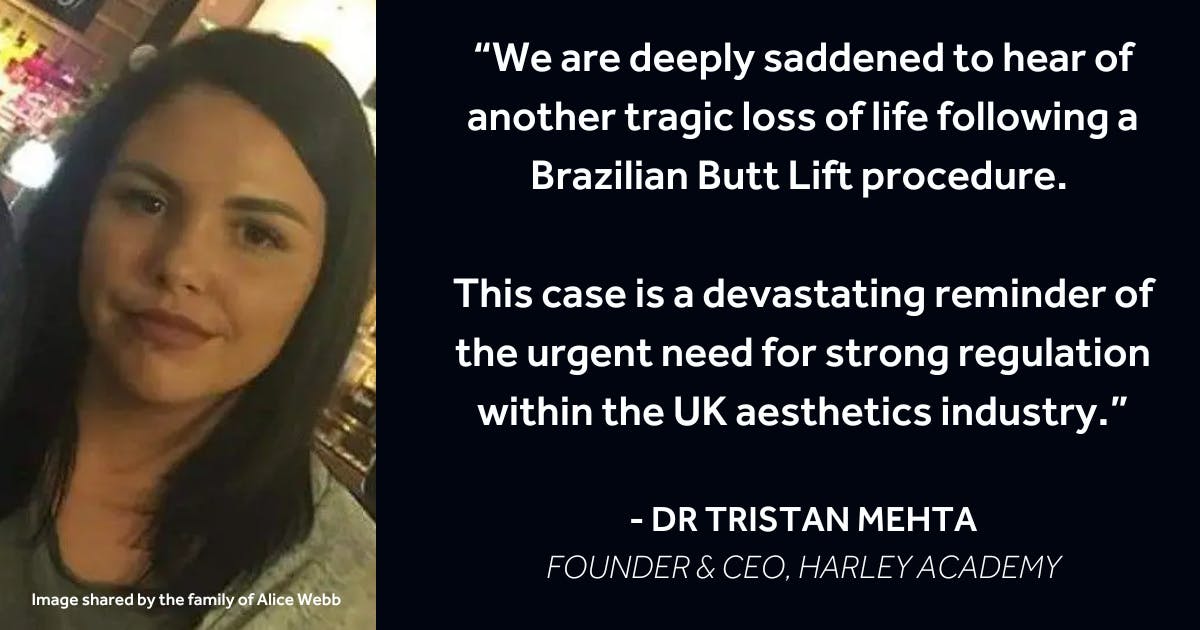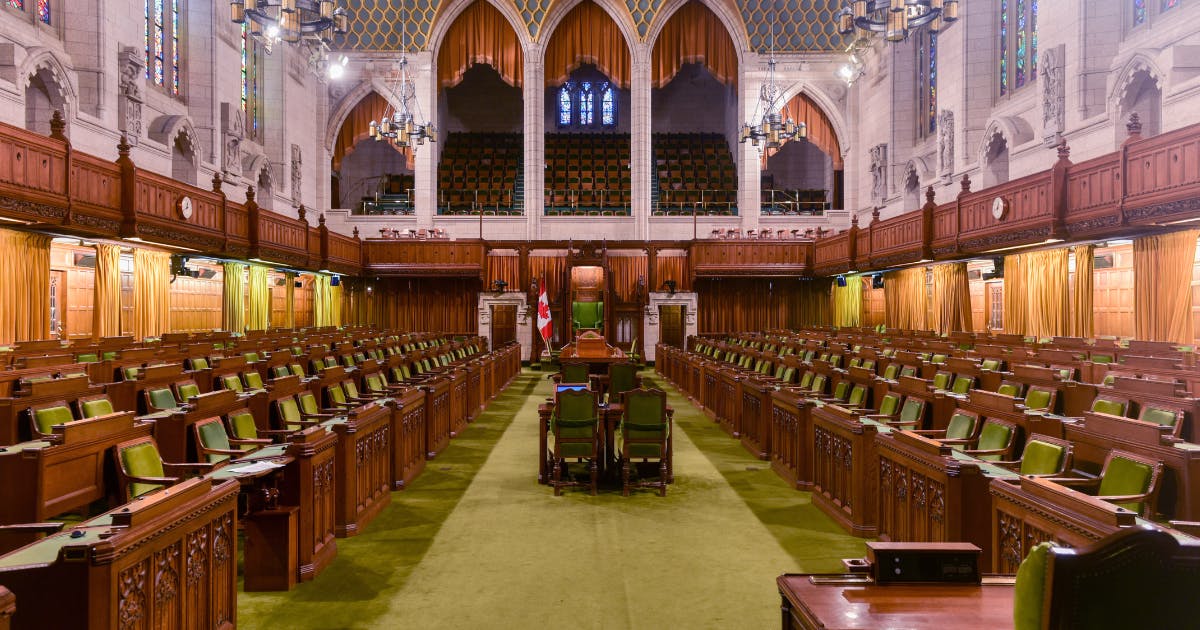Tighter Aesthetics Industry Regulations Call After BBL Death

At Harley Academy, we once again call for tighter aesthetics industry regulations after news of a recent UK tragedy.
A 33-year-old woman, Alice Webb, has died following a non-surgical Brazilian Butt Lift (BBL) in Gloucestershire. The procedure is understood to have been carried out by a non-medic. It’s reportedly the first BBL death in the UK. However, at least one other Brit has died as a result of a BBL in Turkey.
Whilst non-surgical 'liquid' BBLs are not illegal in the UK, due to a lack of aesthetics regulation, there are minimal requirements for people who perform them. This results in a huge patient safety challenge that is not just limited to this particular treatment. It is something that affects the entire aesthetic medicine specialty and requires the government’s immediate attention.
Below is our official statement on the matter. We also explain more about complications from BBLs, where we are with aesthetics regulation and how you can help.

Robust aesthetics industry regulations are needed in the UK
The following statement is from Dr Tristan Mehta, Founder & CEO of Harley Academy.
“We are deeply saddened to hear of another tragic loss of life following a Brazilian Butt Lift procedure.
“This case is a devastating reminder of the urgent need for strong regulation within the UK aesthetics industry.
“The UK urgently needs tighter regulatory frameworks to ensure only medically qualified practitioners can administer treatments, especially those as complex and potentially dangerous as BBLs.
“While BBLs are often considered surgical, non-surgical aesthetic treatments such as dermal fillers and injectables are also being carried out by individuals who lack even the most basic medical qualifications.
“As it stands, almost anyone can legally perform these procedures with minimal or no medical or aesthetics training. This is simply unacceptable in an industry dealing with people’s health and well-being.
“Harley Academy urgently calls on the Government to re-prioritise and support the development of aesthetic industry regulations, being led by the JCCP group. It is clear that the public is at risk and patients have been dying in the months it has taken for the Government to review and implement the recommendations provided by the JCCP on how to improve regulations and make the industry safer.
“We call for swift regulatory action to protect patients and prevent further tragic outcomes. This includes the following…”
1. Mandatory medical qualifications
“All practitioners offering invasive procedures should hold medical qualifications.”
2. Aesthetics licensing and oversight
“Clinics and practitioners must be held accountable through a formal aesthetics licensing system. Regular inspections and adherence to high standards of care must be ensured.”
3. Public awareness
“Patients must be made aware of the risks and know how to identify qualified aesthetic practitioners. More needs to be done to educate the public about the importance of seeking out credible, highly-trained medical professionals.
“This tragedy is yet another wake-up call to the entire industry and the Government,
and we hope this spurs them to act now for better regulations. At Harley Academy,
we will continue to drive forward standards of aesthetic medicine education and patient safety. We remain committed to shaping a safer future for aesthetics in the UK.”
Where are we on aesthetics regulation for England?
After years of proposals and inquiries, 2nd September 2023 saw the first movement on aesthetics regulation for England. The Department of Health & Social Care (DHSC) released its first proposals and it was noted that this was the first in a series that would be rolled out.
This initial document concerned the introduction of a licensing scheme for non-surgical aesthetics practitioners.
These took a two-pronged approach, covering a mandatory licence to practise aesthetic medicine for practitioners, plus a separate premises licence.
They announced the intention to ‘RAG rate’ procedures - categorise them as Red/Amber/Green according to risk factors. It was recommended that an aesthetics licence would be required for each treatment category and practitioners would be restricted to treat within their competency ‘colour’.
You can find out about these proposals for an aesthetics licensing scheme, oversight for non-medics and more, in our interview with Professor David Sines, CBE. David is the Chairman of the Joint Council for Cosmetic Practitioners (JCCP) and broke everything down in a discussion with Dr Tristan.
A public consultation followed this initial release, to gain feedback from the industry, patients and the wider population. This concluded weeks later and the results were thought to be due to be announced in the first quarter of 2024.
Delays exacerbated by change in Government
Whilst Government regulatory work is often a lengthy process, September’s initiative showed promise. Momentum was quickly lost, however, as delays crept in.
The proposals require sign-off from the then Health Minister, however, by May 2024 this had still not been received. Then, a General Election was called, resulting in the dissolution of Parliament and all ministerial duties were paused.
This election took place in July 2024, with Labour securing a victory just before Parliament’s Summer recess. Before and after new ministers were appointed, the JCCP reached out to stress the importance of pushing this regulation through. They remain in close contact, committed to seeing this through.
As this patient safety issue and the need for robust aesthetics regulation have always had cross-party support, it was confirmed that this is still on the Government’s radar. However, a year on from the initial consultation, its priority level remains unclear.
It’s often been said that no one wanted to wait for fatalities to drive home just how important this regulation is. We’re now passed that and the need to introduce the licensing scheme is critical.
It’s worth noting that this process only applies to England. Scotland, Ireland and Wales set their own laws on this but it’s generally been felt that they would follow suit with what England introduces.
Medical aesthetics training and the regulatory issue
As a medical aesthetics business, run by healthcare professionals, patient safety is of primary importance to us. Ethical, evidence-based teaching is at Harley Academy’s core. Dr Tristan founded the business to address the lack of rigorous clinical aesthetics training he discovered on his own career journey.
The truth is that aesthetic practitioners without advanced medical training cannot fully appreciate or mitigate the risks associated with invasive treatments.
Furthermore, the public is often unaware of the importance of seeking out highly qualified aesthetics practitioners. On top of this, there’s a lack of awareness surrounding other related issues, including:
- Dangers of cutting costs
- Having unregulated treatments abroad
- Being treated by unlicensed providers.
Thorough filler and botox courses that provide rigorous medical aesthetics training in areas that include facial anatomy, skin ageing, consultation skills, facial assessments, preventing and managing complications - not just injection techniques, are greatly needed.
Having this type of theoretical and practical expertise, as provided through our Ofqual-regulated Level 7 Diploma in Botox & Dermal Fillers, ensures aesthetics practitioners have the necessary medical knowledge to provide safe, ethical and effective care.

What can you do to speed up the process of aesthetics regulation in the UK?
We understand the frustration of this issue not being addressed and are often asked “What can I do to make it happen sooner?”
For England, this is in the hands of the Government, so there are two things you can do.
1. Write to your local MP
Send an email or letter to your local MP to explain your concerns and detail your experiences. Provide your insights as a medical aesthetics practitioner living and/or working in their constituency. Ask them to raise the issue in Parliament during Prime Minister’s Questions. They are required to respond to you and should also follow up explaining the Prime Minister’s response to their question.
If you’re unsure who your MP is or need their email address or phone number, you can use the MP Finder on the Government website. Alternatively, you can write to them at the House of Commons, London SW1A 0AA.
2. Write to the Health Minister
At the time of writing, the Secretary for Health & Social Care is Wes Streeting, MP. He is also the MP for Ilford North. As the minister responsible for oversight of social care policy, it is his duty to accelerate regulatory matters.
You can find Wes Streeting’s email address, phone number and mailing address on his website. As above, you can also write to him at the House of Commons.
Educate your patients and social media audience
Outside of these direct actions, supporting campaigners in this space and educating your patients on what to look for in a cosmetic injector are also worthwhile.
Share details of your medical background, what specific aesthetics training you’ve completed and what you’ve learned. This can help to communicate just how much knowledge you have as a well-trained healthcare professional.
Highlight how you are able to prevent and manage complications from cosmetic injectables, plus the accountability you have as a medical professional. Talk about your filler and botox courses, what they’ve allowed you to do and why this is important.
Get used to including messages about safety, ethics and accountability in your day-to-day marketing. Take a look at Haswell Aesthetics’ Instagram account as a great example of this. Natalie Haswell is an aesthetic medicine expert, Harley Academy Level 7 graduate-turned-clinical trainer and Allergan Institute Board member, with a thriving practice in Colchester, Essex. She is passionate about patient safety and regularly communicates this to her audience.
The more educated patients are, the more they’ll - hopefully - choose medical practitioners ahead of eventual aesthetics regulation becoming law.

Complications that can occur from surgical and liquid BBLs
Dr Tristan has provided additional guidance that may be of interest in relation to the sad fatality being reported.
“Both surgical and non-surgical Brazilian Butt Lifts carry significant risks. It's crucial for the public to understand these before considering any procedure,” he counsels.
Potential surgical BBL complications
“This involves transferring fat from one part of the body to the buttocks. One of the most dangerous complications is fat embolism. This is where fat enters the bloodstream and travels to the lungs or heart, which can be fatal.
“Other complications include infection, excessive bleeding, nerve damage, and necrosis (death of tissue). Additionally, poor fat grafting techniques can lead to asymmetry, lumpiness, or fat reabsorption, causing the procedure to fail.”
Possible Liquid BBL complications
“This involves using dermal fillers to augment the buttocks. Although less invasive, it still carries risks, especially if not performed by a trained practitioner.
"Complications include vascular occlusion, the blockage of blood vessels, which can lead to skin necrosis and scarring. The use of unapproved or unsafe filler materials can result in chronic inflammation, infections, or even life-threatening reactions.”
Dr Tristan warns, “In both procedures, the risk of permanent disfigurement or serious health complications is real and should not be underestimated.”
Circumstances that can increase the risk of side effects from BBLs
“The risk of complications is significantly heightened when these procedures are performed by unqualified practitioners or in non-regulated environments,” states Dr Tristan.
He lists the key factors that increase the likelihood of complications, as follows.
Unqualified aesthetics practitioners
“Individuals without proper medical training or certification may lack the necessary understanding of anatomy, sterile technique and the ability to manage complications. They may also use improper methods or unsafe materials that can cause serious harm.”
Lack of facility regulation
“Procedures carried out in unregulated settings may lack basic medical standards. These include infection control, resuscitation equipment and the ability to manage post-procedure complications.”
Inappropriate candidates
“High-risk patients, such as those with underlying health conditions, obesity or smokers, are more likely to experience complications during or after surgery. An unqualified practitioner may not screen patients adequately or may proceed with a procedure despite red flags.”
Improper techniques
“Whether it’s poor fat grafting in surgical BBLs or unsafe injection techniques in liquid BBLs, technical mistakes can lead to devastating outcomes. These can include nerve damage, excessive scarring and, in extreme cases, death.”
How people can go about getting a BBL safely
Dr Tristan stresses, “If someone is considering a BBL, the first and most important step is to seek out a qualified and experienced medical practitioner.”
Here are some important steps he recommends for ensuring a safe BBL procedure…
Verify the practitioner’s credentials
“Check that your surgeon or aesthetic practitioner is properly trained, qualified and registered with the General Medical Council (GMC) for surgical procedures, or trained in non-surgical cosmetic injectables with a reputable medical aesthetics training provider such as Harley Academy.”
Ask about their BBL experience, specifically
“It is essential to choose a practitioner with extensive experience with BBLs. Ask how many procedures they have performed and about their complication rates.”
Clinic safety standards
“The procedure should be carried out in a regulated medical facility that meets high standards of hygiene. It must have proper equipment and be ready to handle emergencies. For surgical BBLs, this means a licensed surgical centre with proper accreditation.”
Realistic expectations and clear communication
“A responsible practitioner will take the time to fully explain the risks and manage expectations. Patients should always be informed about both the best and worst outcomes, and there should be a comprehensive discussion of the aftercare and recovery process.
Avoid cut-price deals and travelling abroad for high-risk cosmetic procedures
“Cheaper is not better when it comes to cosmetic procedures. Be wary of low-cost deals or practitioners offering services without proper medical oversight. This can often be a red flag for unsafe or unregulated treatments,” notes Dr Tristan.
“Finally, avoid travelling abroad for high-risk procedures in countries where standards may differ. While it can be tempting due to lower prices, the risks are often far greater and follow-up care is more complicated when you're far from home.”
All information correct at time of publication
Download our full prospectus
Browse all our injectables, dermal fillers and cosmetic dermatology courses in one document
By submitting this form, you agree to receive marketing about our products, events, promotions and exclusive content. Consent is not a condition of purchase, and no purchase is necessary. Message frequency varies. View our Privacy Policy and Terms & Conditions
Attend our FREE open evening
If you're not sure which course is right for you, let us help
Join us online or in-person at our free open evening to learn more
Our Partners













STAY INFORMED
Sign up to receive industry news, careers advice, special offers and information on Harley Academy courses and services

